Belgium is famous for its history and stunning landscapes. But it’s also known for its unique business culture. The Belgian work ethos is shaped by the country’s diverse traditions and influences.
Exploring this culture is key for those wanting to work with Belgian businesses. Local customs and practices play a big role in trade and collaboration in the EU.
Understanding the Essence of Belgian Work Ethos
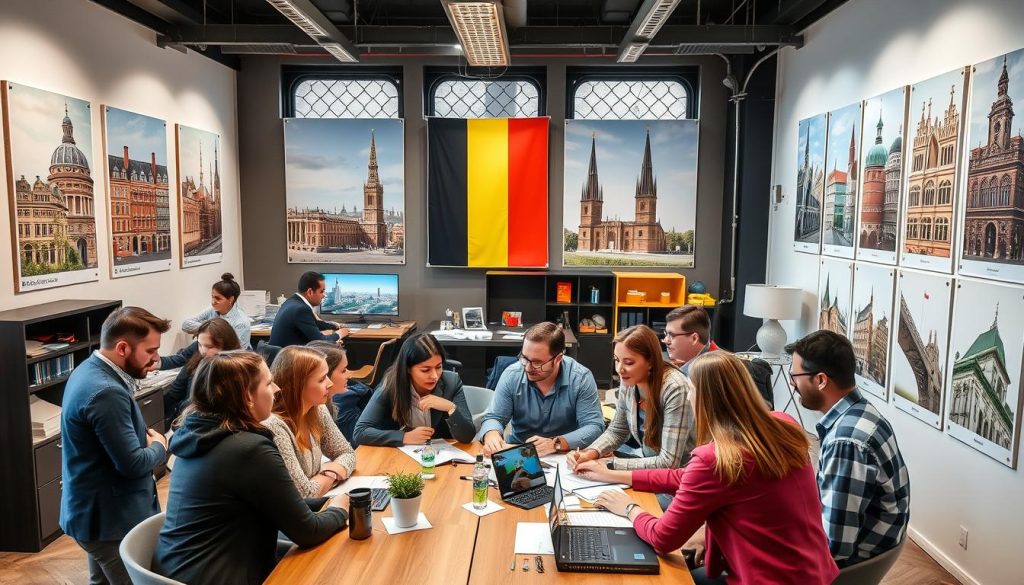
The Belgian work ethos is shaped by history and society. Over time, trade routes and industrialisation have influenced work practices. These factors have created a unique blend of dedication, responsibility, and teamwork.
Historical Influences on Work Practices
Belgium’s work practices have been shaped by its past. The Middle Ages brought busy trade routes that boosted commercial growth. This led to a focus on being on time and reliable.
The industrial revolution then made these values even more important. It brought a focus on being efficient and productive.
Comparative Analysis with Other European Nations
Belgium’s business culture is distinct in Europe. It values teamwork and community more than some other countries. Belgians often see success as a team effort, not just individual achievements.
This approach creates a supportive and reliable work environment. It sets Belgium apart from other European countries.
Key Characteristics of Business Culture in Belgium

The business culture in Belgium is known for its formal communication and a strong hierarchy. These elements are key to understanding how to communicate effectively. They shape how people interact and make decisions.
Formality in Communication
In Belgium, business talks are always formal. This shows respect and professionalism. People use formal titles and surnames when meeting for the first time.
This creates a respectful space for good conversations.
- Formal greetings are standard, involving handshakes and the use of polite language.
- Written communication often adheres to a formal structure, with emphasis on proper etiquette.
- Meetings begin and end punctually, as respecting time is a significant aspect of professionalism.
Importance of Hierarchy and Respect
The hierarchy in Belgian businesses is very important. Respect is key in making decisions and talking. Authority and seniority are respected in discussions and decisions.
- Junior employees often defer to their seniors, seeking guidance and approval on major decisions.
- Hierarchy does not solely dictate communication; it also affects teamwork and collaboration.
- Cultivating relationships is essential, as trust and respect facilitate smoother business interactions.
The Role of Languages in Belgian Business Settings

Belgium’s mix of languages greatly influences its business world. This diversity brings both chances and hurdles in talking to each other. It’s key to grasp how multilingualism in Belgium helps in building connections and running businesses well.
Multilingual Practices and Their Advantages
In Belgium, the many languages spoken offer big benefits in work. Companies use many languages to improve teamwork and create a welcoming work place. The main pluses of using different business languages are:
- It makes talking to clients and partners from various language backgrounds better.
- It helps reach more customers by appealing to a wider audience.
- It promotes a culture that values and celebrates different views.
Using many languages helps build stronger ties and deeper understanding among all involved. This shows the value of multilingualism in Belgium.
The Impact of Language on Business Relations
Good business language in Belgium is more than just talking. It affects how well businesses work together and succeed. Each language has its own cultural meanings, which can change how people see each other. Knowing these differences can lead to:
- Deeper, more respectful relationships.
- Good first impressions by speaking a client’s language.
- Clearer communication, which helps solve problems better.
Companies that see the value of language build stronger business ties. They also set themselves up for long-term success in Belgium’s tough market.
Networking Styles in Belgium

Networking in Belgium is key in the business world. It helps professionals make connections. Building personal relationships is crucial, as many deals come from these networks.
The Value of Personal Relationships
In Belgium, personal connections in business are vital. Trust and rapport are key to strong professional ties. Key points include:
- Investing time in building connections is important.
- Face-to-face interactions are valued.
- Long-term relationships are preferred over quick deals.
Networking focuses on building these relationships. They are essential for successful partnerships.
Social Networking Events and Their Significance
Going to Belgian social events is crucial for networking. Trade fairs and local meetups are great for connecting. Notable events include:
- Annual trade fairs that attract industry leaders.
- Networking breakfasts and lunches for casual talks.
- Workshops for sharing skills and working together.
These events help professionals network and learn about new trends. Meeting peers in a relaxed setting strengthens relationships. This can lead to more business opportunities.
Etiquette and Behavioural Norms

Knowing Belgian business etiquette is key for good professional relationships. It includes meeting protocols and the right dress code in Belgium. These show the country’s dedication to professionalism. Following these rules helps show respect and improves communication at work.
Business Meeting Protocols
Belgian meetings stress being on time and well-prepared. Being late is seen as bad. Important parts of meeting culture are:
- Proper greetings, like a firm handshake and direct eye contact.
- Starting with small talk, like news or travel, before serious talks.
- Having a clear agenda, where everyone gets to share their thoughts.
Listening well and speaking clearly are valued. Knowing these meeting rules helps build good relationships with Belgian colleagues.
Dress Code Expectations
The dress code in Belgium depends on the industry and company culture. Usually, smart-casual is fine for most business settings. Some key points to remember are:
- Formal suits are needed in finance and law.
- In creative fields, business casual is okay, letting you show your style.
- Always look polished and professional, no matter the industry.
Following these dress code tips shows respect and awareness of the professional scene in Belgium.
Business Culture in Belgium: Regional Differences
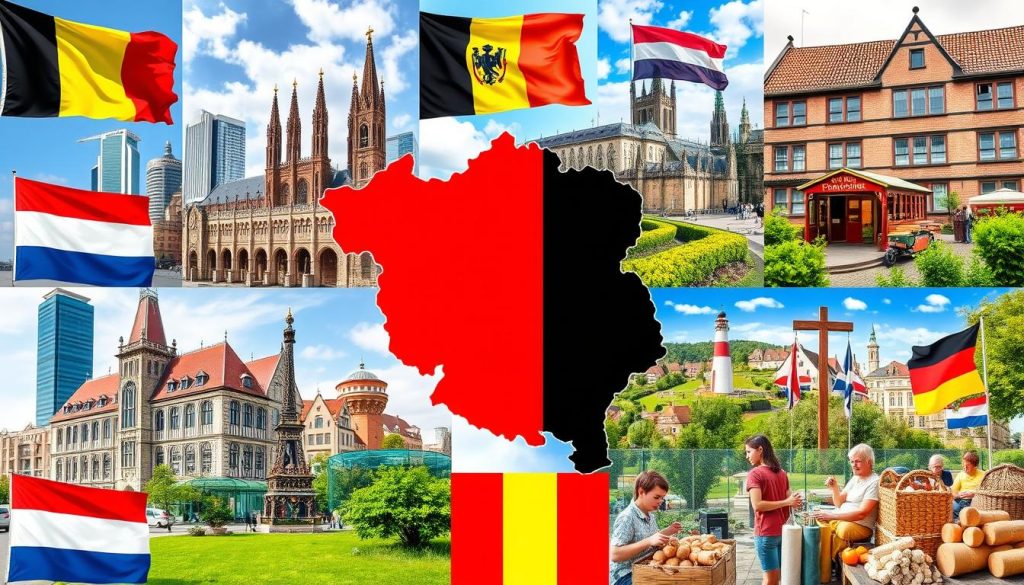
Belgium’s business world is shaped by its regions. The Flemish and Walloon areas have their own ways of doing business. Knowing these differences is key for success.
Flemish vs. Walloon Approaches
The Flemish region is known for its competitive and direct business style. Building personal relationships is important, but results come first. Meetings are all about getting things done quickly and clearly.
On the other hand, the Walloon region values teamwork and reaching consensus. Discussions are longer, and decisions are made after careful consideration. This approach requires patience and diplomacy.
The Influence of Brussels as a Business Hub
Brussels is a major business centre, where Flemish and Walloon cultures meet. Its diverse population creates a unique business environment. This diversity leads to innovative partnerships and opportunities.
For businesses to succeed in Belgium, understanding the local culture is crucial. Recognising the differences between Flemish and Walloon business practices helps adapt strategies. This way, companies can better meet the needs of their partners.
The Importance of Work-life Balance
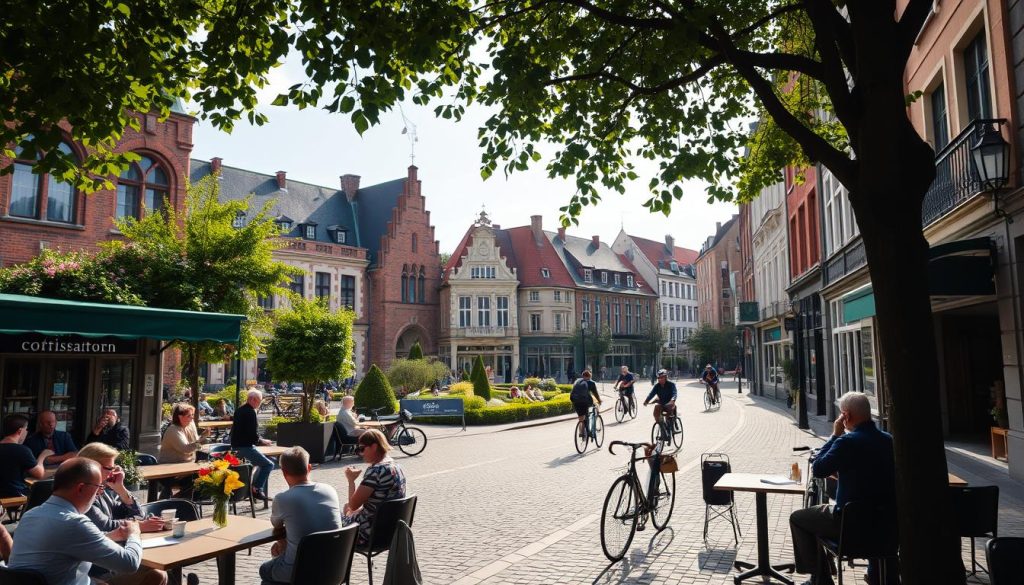
In Belgium, work-life balance is very important. It shows a commitment to keeping work and personal life separate. This idea affects many parts of daily life, including how people view overtime.
Cultural Attitudes towards Overtime
In Belgium, people generally want to keep their personal time safe from work. Many don’t want to work too much overtime. They see it as bad for their quality of life. This view makes companies try to respect their employees’ free time, focusing on their wellbeing more than just working long hours.
Emphasis on Leisure Activities
Belgium’s love for leisure time goes hand in hand with its work-life balance. People enjoy a wide range of activities in their free time, from sports to cultural events. This helps them connect better with family and friends, making them happier and more productive.
The Belgian Approach to Negotiation

In Belgium, negotiation is a mix of patience and careful planning. Business people use a detailed method to make sure everyone is heard and valued. Knowing these strategies can help both locals and visitors.
Strategies Commonly Utilised
Belgian negotiation focuses on detailed planning and building relationships. Some key strategies include:
- Doing lots of research before talks, to gather all the needed info.
- Having discussions with more than two people to help everyone agree.
- Building trust and rapport first, as a base for talks.
- Keeping communication clear, paying close attention to language and tone.
Tactics for Successful Outcomes
Belgian professionals use certain tactics in negotiations:
- Being patient and taking time for all to understand.
- Listening well to make sure everyone’s views are heard.
- Avoiding aggressive tactics to keep relationships strong.
- Looking for benefits for both sides to make future deals more likely.
Gender Dynamics in Belgian Business

The landscape of gender dynamics in Belgium is changing, especially with women in leadership. More women are reaching top positions in different sectors. This shows a gradual move towards more equality in the workplace.
Women in Leadership Roles
Women are becoming leaders in Belgian businesses more often. Reports show a steady increase in women in executive roles over the last decade. Companies see the benefits of diversity in decision-making and success.
This trend inspires more women to aim for leadership roles. It helps create a more balanced work environment.
Gender Equality in the Workplace
Belgium is making strides in workplace equality through initiatives and campaigns. Many companies are working to create inclusive work cultures. They use flexible work options and mentorship to support gender equality.
Yet, challenges persist, like achieving equal pay and fighting stereotypes at work.
Corporate Social Responsibility in Belgium
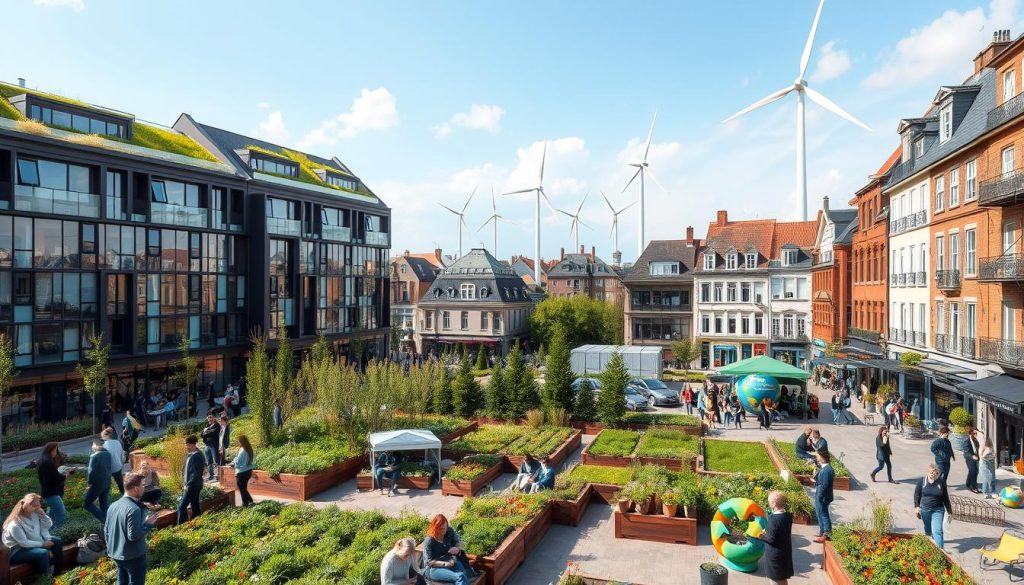
Corporate social responsibility (CSR) is key for Belgian businesses. They focus on ethical and sustainable actions. This approach is not just good; it’s a way to stand out.
The government and society push for this. They want businesses to think about social and environmental issues in their work.
Expectations of Local Businesses
CSR expectations in Belgium change with each industry. But, more people know about it and care. They want companies to focus on being responsible.
So, local businesses should:
- Use sustainable ways to make things.
- Work with local communities and groups.
- Support equality and diversity in their teams.
- Find new ways to lessen their environmental impact.
Case Studies of Prominent Belgian Companies
Some top Belgian companies show great CSR efforts. They meet community needs and reach their business goals. Here are a few examples:
- Anheuser-Busch InBev: This big brewery works hard on being green. It has “Global Smart Drinking Goals” and projects to cut down on carbon.
- Solvay: Solvay, a chemical company, goes for a circular economy. It focuses on using resources well and cutting down waste. This helps the community and the planet.
Impact of European Union Regulations on Belgian Businesses
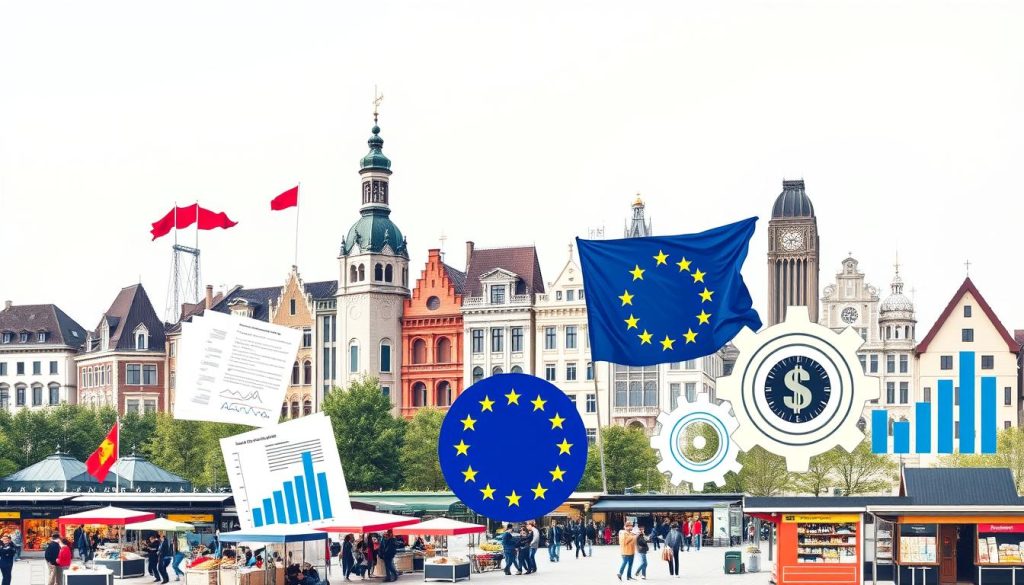
The European Union has a big role in shaping business in Belgium. It’s key for companies to know the EU rules to do well here. Following EU laws helps Belgian businesses grow and succeed.
Understanding Compliance Requirements
Belgian businesses need to know EU rules well. They must follow laws on the environment, consumer rights, and data privacy. Staying compliant boosts a company’s reputation worldwide.
Regional Opportunities within the EU Framework
EU rules open up big chances for Belgian businesses. They can trade easily across borders and reach more customers. EU funds help Belgian companies innovate and stay ahead in the market.
The Innovation Landscape in Belgian Enterprises

Belgium is now a hot spot for new ideas, especially in its startup world. It’s a mix of creativity, tech, and a supportive community. This helps Belgian startups grow. Groups and programs are working hard to help these businesses innovate.
Startup Culture and Support Systems
The startup scene in Belgium is all about working together and getting the right tools. Entrepreneurs get help from incubators and accelerators. Places like Start it @KBC and Co.Station offer:
- Networking events
- Mentorship programs
- Co-working spaces
- Funding
Local governments and investors see the value in startups. They work together to boost innovation. This helps the economy and makes startups key players in innovation.
Collaborations between Corporates and SMEs
Big companies and small ones teaming up is key in Belgium. It helps big firms use the quick thinking and new ideas of SMEs. These partnerships lead to big changes in tech and design. For example:
- Research and development projects
- Joint ventures
- Product innovation and development
These partnerships make businesses stronger and help the whole innovation scene. They help Belgian companies stay ahead in a changing market.
Industry-Specific Cultural Norms

Belgium’s economy is diverse, with different norms in each sector. These norms shape how businesses operate. Knowing these differences can help teams work better together in Belgium.
Sector Variations in Business Practices
Business culture changes a lot in Belgium, depending on the sector. Each industry has its own way of doing things. Here are some main differences:
- Pharmaceutical Business Culture: The pharmaceutical world focuses on following rules and being precise. It values careful research and being responsible.
- Belgian Technology Sector: Technology is all about new ideas and being flexible. It’s a place where creativity and teamwork are key.
- Manufacturing and Logistics: This area is all about being on time and efficient. It values clear communication and respect for those in charge.
Examples from the Technology and Pharmaceutical Domains
Looking at specific examples gives us a better idea of what’s happening in Belgium. In tech, companies like Umicore lead in research and green tech. They work together and share ideas freely.
In pharmaceuticals, companies like UCB put ethics and following rules first. They focus on doing great research and sharing data. This shows how important trust and honesty are in this field.
The Future of Business Culture in Belgium

The world of business is changing fast, and Belgium is feeling this change. New trends are shaping the future of business culture here. These changes will help businesses grow and succeed in a tough market.
Trends Influencing Change
Business trends in Belgium are key to its corporate growth. Some big trends include:
- More focus on being green and caring for society
- Remote work and flexible hours becoming common
- More effort to include everyone in the workplace
- Using new tech to work better
These trends are moving towards a more flexible and welcoming business culture. This matches what today’s workers want.
The Role of Digital Transformation
Digital transformation is making a big difference. Companies are using new tech to change how they talk, work together, and serve customers. Important parts of this change are:
- Using artificial intelligence to make decisions
- Connecting with customers online
- Using data to plan better
- Changing old business models to new, flexible ones
These changes are shaping the future of business culture in Belgium. They’re creating a place where tech skills and caring for people go hand in hand.
Crucial Tips for Foreign Businesses
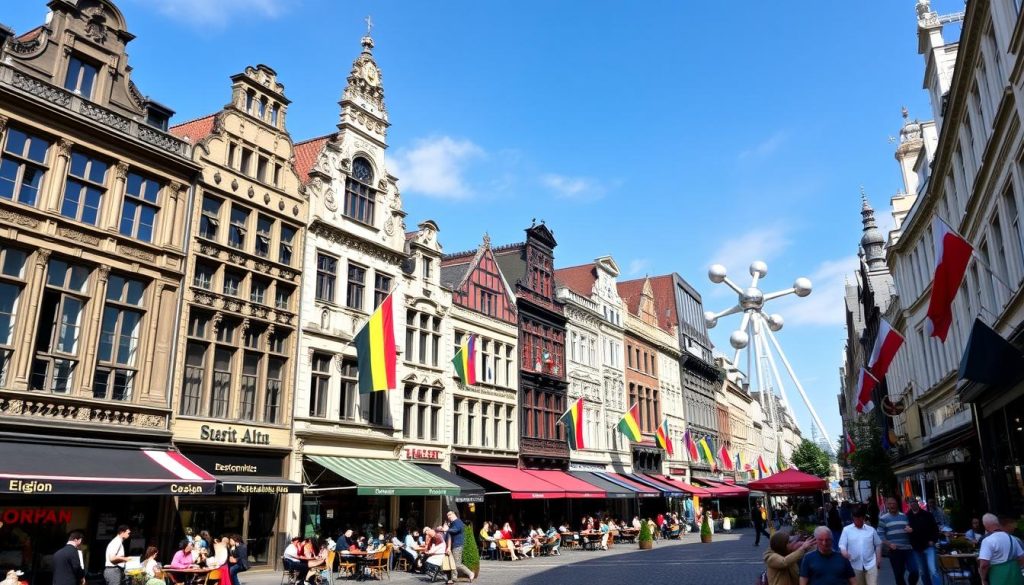
Entering the Belgian market can open up many opportunities for foreign businesses. They must understand and respect local customs and practices. To succeed, they need to know how to build relationships and navigate cultural differences.
Adapting to Local Customs
Adapting to customs is key to a positive business environment in Belgium. Here are some strategies for foreign businesses:
- Learn about Belgian etiquette and communication styles to ensure respectful interactions.
- Be punctual for meetings, as timeliness is highly valued in Belgian culture.
- Understand the importance of formal greetings and using appropriate titles during introductions.
Building Successful Partnerships
Building partnerships in Belgium takes patience and a customised approach. Here are some key tactics:
- Engage in face-to-face meetings to establish trust and rapport with potential partners.
- Be transparent in communication and negotiations to demonstrate reliability.
- Participate in local networking events to connect with other professionals and enhance business opportunities.
Closing Remarks on Belgium’s Business Culture
Exploring Belgian business culture shows a mix of history, regional differences, and various communication styles. This summary highlights the importance of relationships, language variety, and networking in business success. Knowing these aspects is crucial for those wanting to invest or work in Belgium.
The corporate world in Belgium values formality, respect for hierarchy, and a good work-life balance. These elements help create a respectful and understanding business environment. For global companies, understanding these cultural details can greatly improve their work and build strong partnerships.
In summary, valuing Belgium’s business culture, with its rich history and changing practices, offers big benefits. By using these insights in planning and daily work, businesses can handle the market’s challenges better. Building strong, culturally-aware relationships in Belgium is key to lasting success in this unique business environment.

